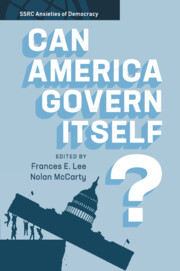
-
Select format
-
- Publisher:
- Cambridge University Press
- Publication date:
- May 2019
- June 2019
- ISBN:
- 9781108667357
- 9781108497299
- 9781108739726
- Dimensions:
- (228 x 152 mm)
- Weight & Pages:
- 0.66kg, 368 Pages
- Dimensions:
- (228 x 152 mm)
- Weight & Pages:
- 0.56kg, 368 Pages
You may already have access via personal or institutional login
Book description
Can America Govern Itself? brings together a diverse group of distinguished scholars to analyze how rising party polarization and economic inequality have affected the performance of American governing institutions. It is organized around two themes: the changing nature of representation in the United States; and how changes in the political environment have affected the internal processes of institutions, overall government performance, and policy outcomes. The chapters in this volume analyze concerns about power, influence and representation in American politics, the quality of deliberation and political communications, the management and implementation of public policy, and the performance of an eighteenth century constitution in today's polarized political environment. These renowned scholars provide a deeper and more systematic grasp of what is new, and what is perennial in challenges to democracy at a fraught moment.
Reviews
'Lee and McCarty have put together a stellar team of authors to address one of the most critical questions facing Americans: can our governing institutions cope with intense partisan polarization? The resulting chapters offer valuable insights into how representation, lawmaking, and policy implementation work - and fail to work - in our political system.'
Eric Schickler - University of California, Berkeley
'America's democratic institutions - in Washington and beyond - are under stress. This robust volume brings together an all-star cast of scholars to probe the nation's governing capacity and to consider the prospects for significant reform.'
Sarah Binder - George Washington University, Washington DC and The Brookings Institution
'With public trust in political institutions plummeting, parties growing ever more divided, and our elected leaders failing to attend to pressing national problems, we are right to wonder whether our political system is up to the most basic tasks of governance. In this fine volume, Frances E. Lee and Nolan McCarty assemble a terrific group of scholars who offer a range of answers - some reassuring, some not - that reformers would do well to heed in this age of anxiety.'
William Howell - University of Chicago
Contents
Metrics
Altmetric attention score
Full text views
Full text views help Loading metrics...
Loading metrics...
* Views captured on Cambridge Core between #date#. This data will be updated every 24 hours.
Usage data cannot currently be displayed.
Accessibility standard: Unknown
Why this information is here
This section outlines the accessibility features of this content - including support for screen readers, full keyboard navigation and high-contrast display options. This may not be relevant for you.
Accessibility Information
Accessibility compliance for the PDF of this book is currently unknown and may be updated in the future.


